|
|
|
|
|

|
|
|

|
|
|
|
|

|
브러쉬
런 교회
Brush Run Meeting
House
|
|
|
최초의 그리스도의 교회인 브러쉬 런 교회가 알렉산더 캠벨에 의해서 1811년 5월 4일 베다니로부터 약
8KM 가량 떨어진 곳에 세워졌다. 위의 돌비석은 그 자리가 바로 브러쉬 런 교회가 세워졌던 자리임을 가리키고 있다
Site of Brush Run Church organized in May 4, 1811. |
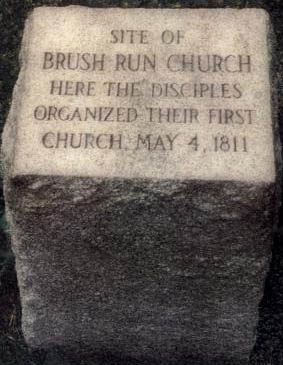
|
|
|
|
|
|
|
|
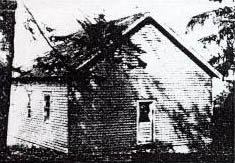
|
브러쉬 런 교회는 본래 웨스트 버지니아주 베다니로부터 약 8KM 떨어진 곳에 있었으나 1912년
알렉산더 캠벨의 저택과 서재 곁으로 옮겨왔다. 위의 사진은 1938년경의 건물모습으로 외부는 옮겨올 당시 새로 만든 것이고, 내부의 지붕을
받치는 기둥과 벽은 본래의 브러쉬 런 교회 건물을 그대로 옮겨 온 것이다. 이 사진을 찍을 당시 마루의 상태가 매우 좋지
않았다.
The present Brush Run Church located at the Campbell Homestead, Bethany, W. Wa.
It was moved there from its original site about five miles from Bethany in 1912.
The weather boarding and outside are modern; only timbers supporting the roof
and walls in the interior are from the original Brush Run Meeting House. The
floor is about to cave in.
(The Christian
Evangelist, September 8, 1938). |
|
|
|
|
|
|
|
|
|
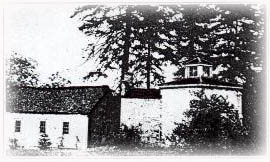
|
|
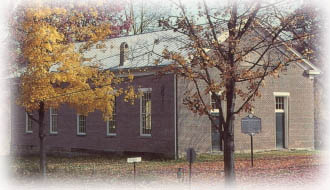
|
위의 사진에서 오른 쪽의 건물이 알렉산더 캠벨의 서재이고, 왼쪽의 건물이
1912년에 옮겨지은 브러쉬 런 교회당 모습이다. 이 사진은 1937년 가을에 수리되기 이전의 지붕모습을 보여주고 있다.
This is another view showing, on the right, the Campbell Study and the Brush Run
Meeting House. This picture shows the roof of the Brush Run Church before it was
repaired last fall. The floor is now about to fall through(The Christian Evangelist,
September 8, 1938). |
|
알렉산더 캠벨이 설교했던 옛 베다니 교회이다. 1831년에 돌로 세웠던 작은 건물을 헐고 1852년에 새로
지어 1915년까지 예배를 드렸던 예배당이다. 남녀의 출입문이 따로 있는 것이 특징이다
The Old Bethany Meeting House. In 1852 this building replaced a smaller, stone
structure erected in 1831. It served the Bethany congregation until 1915.
Alexander Campbell and many other early leaders of the movement preached here |
|
베다니에는 알렉산더 캠벨이 세운 유서 깊은 베다니 대학과 그의 저택, 서재, 그리고 가족 묘지가 잘 보전되어 있어 순례자들의 발길이 잦다 |
|
|

|
|
|
|
|

|
케인 리지 교회
Cane Ridge Meeting House
|
발톤 스톤이 1796년부터 1812년까지 시무했던 케인 리지 예배당이다. 이 건물은 1791년에 건축되었으며, 200년이 훨씬 넘은 지금도
전혀 훼손되지 않은 채 잘 보존되고 있다. 1922년까지 회중을 섬겼다. 독방으로는 미국에서 가장 큰 통나무집이다.
The Old Cane Ridge Meeting House built in 1791 with massive blue ash logs. It
served a congregation until 1922. It is probably the largest single-room log
building in the nation. Scene of famous Cane Ridge Revival of 1801. Here, on
June 28, 1804, was born the Movement known as the Christian Church. |

|
|
|
|
|
|
|
|
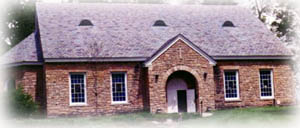
|
이 건축물은 위의 케인 리지 예배당을 보존하기 위해서 1954년에 짓기 시작해서 1957년 6월 28일에 완공하여 헌당된 건물이다. 이 건물
속에 옛 케인 리지 예배당이 자리하고 있다. 이곳은 켄터키주 파리 케인 리지로(路)에 위치하고 있다
Cane Ridge Shrine/superstructure was begun in 1954 and dedicated in June 28,
1957, It encloses The Meeting House, and is constructed of the rare tan or
golden Cane Ridge stone. Cane Ridge is located at 8 miles east of Paris,
Kentucky |
|
|
|
|
|
|
|
|
|
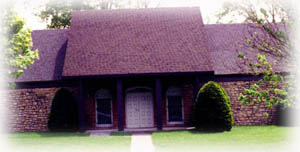
|
|
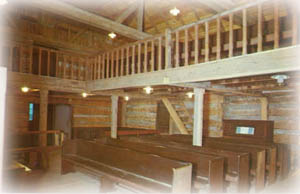
|
이 건물은 1975년에 건축된 발톤 스톤 기념 박물관이다
Barton Warren Stone Memorial Museum, 1975
|
|
케인 리지 교회 예배당 내부의 모습이다. 이층 발코니는 흑인들이 예배드리던 곳이다
Inside view of the old Cane Ridge Meeting House. The gallery shown here was for
the slaves. Its timbers were removed from this building in 1829 and brought back
103 years later, in 1932. |
|
케인 리지 성지는 성도들뿐 아니라, 200년을 지탱해온 통나무 집을 보기 위해서 많은 건축학도들이 찾는 곳이다 |
|
|
|
|
|

|
ⓒ copyright C · C· S
|
|
|
|